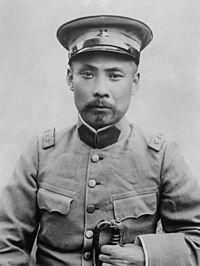
Back Tuan Čchi-žuej Czech Duan Qirui Danish Duan Qirui German Duan Qirui Esperanto Duan Qirui Spanish Duan Qirui Estonian دوان چی ری Persian Duan Qirui Finnish Duan Qirui French דוואן צ'יז'ווי HE
Duan Qirui | |
|---|---|
段祺瑞 | |
 Duan in 1913 | |
| Chief Executive of the Republic of China | |
| In office 24 November 1924 – 20 April 1926 | |
| Premier | Xu Shiying Jia Deyao |
| Preceded by | Huang Fu (acting) |
| Succeeded by | Hu Weide (acting) |
| Premier of the Republic of China | |
| In office 23 March 1918 – 10 October 1918 | |
| President | Feng Guozhang (acting) |
| Preceded by | Qian Nengxun |
| Succeeded by | Qian Nengxun |
| In office 14 July 1917 – 22 November 1917 | |
| President | Feng Guozhang (acting) |
| Preceded by | Li Jingxi |
| Succeeded by | Wang Daxie (acting) |
| In office 26 June 1916 – 23 May 1917 | |
| President | Li Yuanhong |
| Preceded by | Xu Shichang |
| Succeeded by | Wu Tingfang (acting) |
| Acting Premier of the Republic of China | |
| In office 19 July 1913 – 31 July 1913 | |
| President | Yuan Shikai |
| Preceded by | Zhao Bingjun |
| Succeeded by | Xiong Xiling |
| Minister of War of the Republic of China | |
| In office 1912–1915 | |
| Premier | Tang Shaoyi Lu Zhengxiang Zhao Bingjun Himself (acting) Xiong Xiling Sun Baoqi (acting) Xu Shichang |
| Preceded by | Position established |
| Succeeded by | Zhou Ziqi |
| Personal details | |
| Born | March 6, 1865 Hefei, Anhui, Qing Dynasty |
| Died | November 2, 1936 (aged 71) Shanghai, Republic of China |
| Nationality | Chinese |
| Political party | Anhui clique |
| Children | 4 daughters |
| Education | Tianjin Military Academy |
| Occupation | Military officer, statesman |
| Awards | Order of Rank and Merit Order of the Precious Brilliant Golden Grain Order of Wen-Hu |
| Military service | |
| Allegiance | Anhui clique |
| Branch/service | Anhui clique |
| Rank | General |
| Commands | Anhui clique |
| Battles/wars | |
Duan Qirui (Chinese: 段祺瑞; pinyin: Duàn Qíruì; Wade–Giles: Tuan Ch'i-jui, pronounced [twân tɕʰǐ.ɻwêɪ]) (March 6, 1865 – November 2, 1936) was a Chinese warlord, politician and commander of the Beiyang Army who ruled as the effective dictator of northern China in the late 1910s. He was the Premier of the Republic of China on four occasions between 1913 and 1918, and from 1924 to 1926 he served as acting Chief Executive of the Republic of China in Beijing.
A graduate of the Tianjin Military Academy, Duan studied military science in Germany and became a prominent artillery commander under Yuan Shikai. Following the Xinhai Revolution in 1911 and the fall of the Qing dynasty, he became minister of war and premier in the Yuan cabinet. He opposed Yuan's restoration of monarchy in China and, upon Yuan's death, continued as premier and took effective control of northern China. His tenure was marked by political infighting as well as conflict with southern parliamentarians under the leadership of Sun Yat-sen.
In 1917, Duan took part in suppressing another attempt to restore the monarchy, and spearheaded China's involvement in the First World War on the side of the Allies. He also negotiated a series of loans with Japan, with which he built up the Anhui clique and prepared for a conquest of the south. His secret dealings with the Japanese (including the 1918 Sino-Japanese Joint Defence Agreement) later came to light which, along with the Treaty of Versailles's decision to transfer Shandong to Japan, paved way for the May Fourth Movement in 1919. His position weakened, Duan was eventually ousted from power after his defeat in the 1920 Zhili–Anhui War. He came out of retirement in 1924 to head Zhang Zuolin and Feng Yuxiang's Beiyang government, but was again deposed after Zhang's victory over Feng in the Anti-Fengtian War. Duan subsequently retired to Tianjin before settling in Shanghai, where he died in 1936.
© MMXXIII Rich X Search. We shall prevail. All rights reserved. Rich X Search